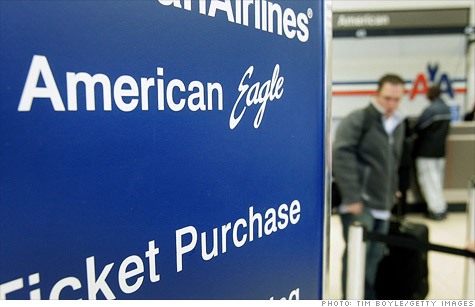Search News

The Department of Transportation is fining American Eagle $900,000 for excessive tarmac delays.
NEW YORK (CNNMoney) -- American Eagle suffered a dubious distinction Monday, becoming the first airline to get fined for excessive tarmac delays, according to the U.S. Department of Transportation.
The government agency fined American Eagle, a subsidiary of American Airlines' AMR Corp., (AMR, Fortune 500) a a civil penalty of $900,000 for delays that occurred earlier this year at Chicago O'Hare International Airport.
Airlines are penalized for tarmac delays exceeding three hours. The department said this is the first time an airline has been fined since the rules on tarmac delays were imposed in April 2010.
The Transportation Department said that American Eagle had tarmac delays of more than three hours on 15 flights arriving at O'Hare. A total of 608 passengers were on the affected flights.
American Airlines, in a prepared statement, blamed the delays on "a single slow-moving weather system and the resulting congestion that developed at the airport" and said it was cooperating with the Transportation Department on making things right.
The airline could have been fined $16.7 million if the case had been brought before an administrative law judge, and if the judge had sided with the passengers.
But under a settlement negotiated with the department, American Eagle was fined $900,000 -- $650,000 to be paid to within 30 days, and up to $250,000 which can be given in refunds, vouchers and frequent flyer mile awards to passengers on the flights, as well as passengers on future flights that experience lengthy tarmac delays of fewer than three hours, the department said.
"American Eagle is absolutely committed to the safety of our customers and employees, and regrets the inconvenience these delays caused," said AMR Chief Executive Dan Garton, in a media release. "We take our responsibility to comply with all the department's requirements very serious and have already put in place processes to avoid such an occurrence in the future."
"We're absolutely thrilled," said Kate Hanni of FlyersRights.org, which pushed for the tarmac rule. "The Department of Transportation has taken a bold move in not only fining the airline, but also mandating that the passengers get 25% of the fine."
Hanni said she suspected the department did not press for more severe fines because of the dismal state of the airline industry, because many of the flights exceeded the three-hour limit by mere minutes.
American Airlines has had a good track record, but its affiliate American Eagle has had more problems adhering to the rule, Hanni said.
The issue of tarmac delays entered the spotlight in February 2007, when passengers were stuck on a grounded JetBlue (JBLU) plane at John F. Kennedy International Airport for at least eight hours during a winter storm.
JetBlue later admitted that it did not handle the weather conditions properly and introduced a customer bill of rights to help customers deal with the problems. The bill of rights allowed customers to deplane from a flight that hadn't left the ground for five hours, and any ground delay of at least 30 minutes resulted in a voucher for future flights.
The Transportation Department said the leading U.S. airlines reported 20 tarmac delays exceeded three hours during the year after the new rules were imposed in April, 2010. That's compared to 693 delays exceeding three hours in the year leading up to the new rules.
Last week, Sen. Barbara Boxer, a California Democrat, and Sen. Olympia Snowe, a Maine Republican, sent a letter urging the department to enforce the rules on tarmac delays, saying that it "is troubling that even though there have been several cases in which extended tarmac delays have occurred, so far no fines have been levied against the airlines that have violated the rules."
The senators authored legislation to establish a Congressional bill of rights for airline passengers.
A Transportation Department official, speaking on background, said the investigation and settlement negotiations were well under way before the letter, and it did not influence the timing of the announcement. ![]()